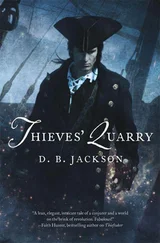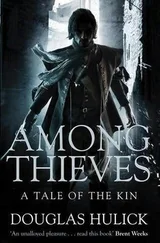“But why not put all the money in there?” Wendy asked.
“My dear, you don’t want to have to go fishing around in there every time you need some cash! Besides, if you are robbed, it is important to have something to give, or else the robber will become more aggressive in searching. Now, have you ever fired a gun?”
“A gun? No…”
“Very well, then, you had better have the little one.” Molly put her foot up on a chair at the kitchen table and pulled up her dress. Silk stocking came up to her thighs, covering well-formed calves. Around her right thigh was a thin leather belt from which hung a small holstered derringer. Molly unbuckled the belt, showed it to Wendy.
“Molly, where did you ever get such a thing?”
“A single girl has to look out for herself,” Molly said. “Now come with me.”
She led Wendy outside again, into the dark yard. “You must always treat a gun as if it was loaded. Don’t ever point it at a person unless there might be a genuine need to shoot them.”
Wendy nodded. Things were moving too fast for her to put words to them.
“Here.” Molly handed her the little gun and Wendy took it, held it carefully as if it were made of delicate china. “Hold it with authority, like you mean it,” Molly advised. “You won’t break it. Now, go ahead and shoot the rhododendron.”
“Shoot…”
“Go ahead. That little thing won’t do any harm.”
Wendy nodded, held the gun out the way she had seen her father do it, looked over the barrel at the dark shape of the rhododendron. She squeezed her eyes tight.
“Wait, wait! Don’t close your eyes.”
“Oh.”
Wendy aimed again, this time focused on keeping her eyes open. She pulled the trigger. The derringer fired with a sharp crack, a flash like a photographer’s flash powder, and a satisfying kick that bent her arm at the elbow so the gun was by her head. A week before, a gunshot would have attracted quite a bit of attention in Portsmouth, but now no one took notice. It was not the first gunshot they had heard that night.
Wendy grinned and looked at Molly. Molly said, “Very good, dear. In any event, if you have to use that, it will no doubt be at close range.”
They went back in the kitchen. Molly showed Wendy how to load the diminutive gun, then they strapped it to Wendy’s leg. She liked the feel of it, the weight, the secret menace. By outward appearance she still looked like a helpless woman. No one but Molly knew her lethal secret. She liked that.
Molly fetched a little silk drawstring reticule. She pulled it open, withdrew another gun, an odd-looking thing with a barrel that consisted of six barrels mounted around a separate shaft. “They call this a ‘pepperbox,’ ” Molly explained as she checked the load in each barrel. “Six shots in revolving barrels.” She explained it as if she were discussing the latest fashion from Paris.
“But see here, Wendy. The gun is always a last resort. Once a gun is pulled, things change, and it is often hard to extract yourself from the situation. Talk is always best. Talk yourself out of any circumstance, and pull the gun when you have no other choice.”
Wendy nodded and wondered where Molly had ever picked up such practical advice. She recalled the time Molly had taught her her secret recipe for pickle relish. Her tone of voice, the manner of her speech, were just the same as they were now. Guns, apparently, were as familiar to her as condiments.
Molly put the pepperbox back in the reticule and hung the bag on her arm. She picked up her carpetbag and Wendy did the same.
“Shall we go?” Molly asked.
Wendy nodded. Once again, words abandoned her. She was not sure what to say. It was perhaps the strangest evening of her life. It was perhaps the most exhilarating.
Unless some competent person of education, system, and brains is put over each division of this [River Defense] fleet it will, in my judgment, prove an utter failure. There is little or no discipline or subordination-too much “steamboat” and too little of the “man-of-war” to be very effective.
MAJOR GENERAL M. LOVELL TO GENERAL G.W. RANDOLPH, SECRETARY OF WAR, CONFEDERATE STATES OF AMERICA
Samuel Bowater ran forward, reached the bottom of the ladder leading to the hurricane deck, pivoted around the rail, and raced up. He hit the upper deck running, passed the walking beam working up and down like a teeter-totter, made straight for the wheelhouse. A lifetime of his father’s strict instruction concerning the conduct of a gentleman, fifteen years of observing the decorum expected of a naval officer, were all obliterated by blind rage. Mississippi Mike Sullivan had set him up, played him like a flute. No one had ever done that to him before.
He reached the wheelhouse, threw open the door. He was breathing hard. In the window on the opposite side he caught his reflection, the picture of a feral and frightening thing, like one of Mr. Darwin’s ape-men. But Sullivan was not there.
“Where-where the hell is Sullivan?” Bowater gasped. Baxter, still at the helm, looked over at him. The cheroot was shorter now but still smoldering. His face was almost expressionless, maybe a bit amused. Men in a rage, looking to kill Sullivan, were probably common enough.
“Salon,” he said, nodding in that general direction.
Bowater cursed, slammed the door, stamped back across the hurricane deck. Sullivan must have gone down the starboard side ladder while Bowater charged up the port. He felt the fury ebb as he took the steps of the ladder fast and hit the main deck below. By the time he reached the salon door, his mood had changed from an irrational hysteria to a more controlled fury.
He kicked the door in, stamped into the big room. Oil lamps on the bulkheads lit the place with a warm, dull light. The riverboat men seemed to be celebrating, holding bottles aloft, shouting, while Bowater’s men stood in a tight and angry cluster to starboard.
“Captain Bowater!” Mike Sullivan extracted himself from the crowd, crossed the deck with hand extended. “Captain, that was a damn well-done thing, back there!”
The bonhomie, which would have irritated Bowater at any time, now made the fury boil again. “You bastard!” he shouted, taking a step toward Sullivan, so they were face to face, though Bowater had to look up to meet Sullivan’s eyes. “You son of a bitch, you played me… help you… steal a goddamned…”
“Ah, hell, Captain, we was just havin some fun! How we do it, here on the river. Come on, now, have a drink and forget it!”
Sullivan held up a bottle. Bowater drew back his arm and hit Sullivan in the face, as hard as he was able to drive his fist, hit him right in the jaw. The pain in his hand was like an explosion, as if he had shattered every bone clear up to his elbow.
Sullivan pivoted around and staggered back, but he did not fall, which was bad, because Bowater had reckoned on laying him out flat with that one blow.
The river pilot turned back to Bowater, blood running from his mouth, and his face was hard to read. Bowater shook out his hand, gasping at the pain, and got ready to take Sullivan on as he came. He had not been in a fistfight since his first year at the Navy School, but he was ready. The blood was up.
The sullen tension in the salon broke like a thunderstorm and the space was filled with shouting and pounding feet. Bowater’s blue-water sailors stormed across the cabin, leaping over tables, snatching up chairs, howling like banshees, and the riverboat men raced to meet them halfway, and then they were into it.
Sullivan straightened, balled his hands into fists. Behind him Bowater saw Ruffin Tanner, holding the back rails of a chair in both hands, drawing it back like he was swinging a baseball bat.
Читать дальше








